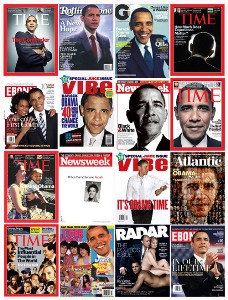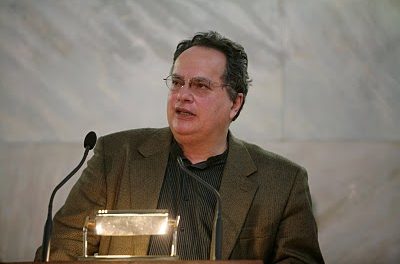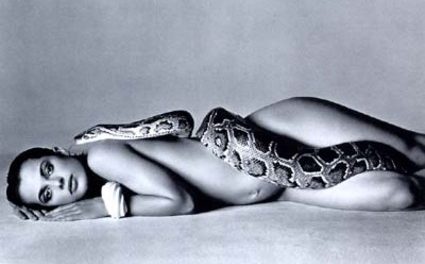By Nikolaos A. Stavrou, Ph.D.
The overwhelming majority of the American people and the world are elated with the election of Barak Obama as the 44th president of the United States. Expectations are justifiably high for the dawn of a new age in American politics and a fresh approach to world problems. No doubt, Obama's election is a monumental event in American history and a testament to the capacity of the political system to accommodate change. But the change we now celebrate had an unbelievably violent history as its midwife; and frankly skepticism still abounds about the scope, meaning and authenticity of the post-racial era now emerging in the United States.
Given the history of violence and de-humanization of an entire race for over four hundred years, one wonders whether Obama can indeed sustain his image as the agent of change and affirm that the United States finally is living up to its credo, or will he be transformed into a mosaic icon, painted by social engineers, to achieve their own soft landing in the age of civilization clashes. Obama has all the attributes of a potentially great president and seems keenly aware of the burdens history has placed on his shoulders. He is the closest we have ever had to justify our belief that America is ready to live up to the promise of its founders. Yet, the euphoric mood that swept the country on November 4 must be tempered with the reality of a post-World War II political class that has proven adept in co-opting ideals and leaders and rendering them irrelevant. The Machiavellian elites, i.e. those who transplanted European "realism" to American shores, have no credible record of supporting substantive change. Their sole concern is their own survival which they usually achieve by promising "change", a concept that is nothing short of a platitude when used by politician of all stripes.
To underscore the significance of the first black man's election to the highest office in the land, we need to undertake a close look at the genesis of the United States and the contradictions of its history.
The birth of the United States, like that of most nations, was a painful one. A revolution against arbitrary rule was fought by people who ardently believed in the lofty tenets of the Enlightenment philosophers. With John Locke and Jean-Jacques Rousseau as the pre-eminent "mentors" of the American renaissance, the Greek ideals of democracy were retrieved from the dungeons of absolutism and the absurdity of "divine right of kings." Similarly, the frightening Augustinian notion that power and authority are "divinely ordained' and, therefore, disobedience to either would be "a cardinal sin", was buried by the power of reason that the revival of Aristotelian thought had restored in Europe.
After a thousand years of ecclesiastical fundamentalism, known as the Dark Ages, the enlightenment philosophers and their American counterparts firmly linked legitimacy of rule to natural rights of men and governance to contractual obligations binding rulers and ruled. Though the notion of government, limited by the precepts of natural law, originated in Europe, it was first experimented in the American colonies. It was there, in the vastness of a continent still unexplored, where the nature, purpose, scope, and function of political authority were debated, modified, and applied. In the new world we will also find the most flagrant contradiction between theory and practice.
The lofty principles of the Declaration of Independence, crisply articulated in the Jeffersonian principle "all men are created equal" and Rousseau's lament "man is born free, and everywhere he is in chains" inspired the colonies to revolt against King George III. But they were soon displaced by the "pragmatic needs" of governance. The concepts of natural law that served as the core ideology of the American Revolution had to be translated into civic rules; and therein lay the tragedy of idealists.
The U.S. Constitution was the first attempt to create a system of laws that links their legitimacy to Natural Law that gives concrete meaning to the notion "all men are born free" and "are created equal." That was the battle cry of American Revolutionaries but not the end product of the Constitutional Convention.
Twelve years after the Declaration of Independence, representatives of the thirteen original states met again in Philadelphia with the urgent tasks of improving the "Articles of Confederation" under which the thirteen former colonies operated since independence. By default, the gathering morphed into a Constitutional Convention with the task of crafting a "more perfect union." They had to. The Confederacy of semi-sovereign states that was established after independence was drifting dangerously towards fragmentation and European powers were patiently waiting to pick up the pieces. These powers were not far away. Napoleon still owned Louisiana, Spain was searching for spoils in the Caribbean and Britain was in Canada.
Fears of fragmentation served as incentives for the great thinkers of a great era to seek a firmer ground for their creation. They came back to Philadelphia with two goals in mind: first and foremost to create a functioning unified nation-state out of thirteen semi-sovereign entities and, second, to try one more time to reconcile the contradiction between natural law that assured sovereignty and equality of all men and a man-made law which, historically, rewarded power and limited freedom. Hovering in Carpenter's Hall where the Constitutional framers met were Rousseau's ghost and Jefferson's invocation of natural law as his rationale to justify his claim "men are endowed with unalienable rights, among them life, liberty, and the pursuit of happiness." In the end, the framers achieved the first goal and ignored the second. They did create a "more perfect union" and a functioning government but could not agree whether the absolute "all men" included black men, too.
Obviously, the core issues of the Philadelphia Constitutional Convention were profound and the disputes fierce. In retrospect, what they offered as "resolution" planted the seeds of two hundred years of racial inequality and the de-humanization of a race. The state delegates to the Convention did not agree on the meaning of "all men" or the definition of "property." To put it differently, they did not agree on where the Black slaves fit in their scheme; were they human beings or "property? How could they agree? Many of the participants were Slave owners themselves while others found the institution of slavery abhorrent. In the end, "pragmatism" and "compromise" carried the day and the operative principles of the Declaration of Independence were relegated to the realm of ideals. In fact, the Declaration's author, Jefferson, was not even there to personally attempt to link his ideals and governance. He was Minister to France accompanied by his black mistress, Sally Hemings, where he kept encouraging Adamantios Koraes to fight for the freedom of Hellenes from Ottoman oppression.
The American Revolution that inspired the heirs of Rousseau to storm the Bastille was about to wind down in 1787 in Philadelphia with compromises that pleased no one and set in motion the social forces that still insisted on reconciling the pre-revolutionary promise and post-revolutionary governance. The quest for a political system that would actualize the Declaration of Independence did not end at the Constitutional Convention; it started there. The Draft Constitution legitimized the de-humanization of Blacks but, in time, it would also serve as the catalyst for change. True, the framers of the U.S. Constitution did not seem overly concerned about freedom for all men, black and white. That issue was left to be resolved by the innate goodness of ordinary people. They apparently believed that the moral outrage that was sure to follow would complete their work sooner or later.
Clashes between idealism and pragmatism defined the formative years of the American Republic as they do to this day. "Pragmatists" won most arguments and idealists the admiration. In the context of such a clash, attempts in Philadelphia to render natural law into a written Constitution would soon lead to one of humanity's most vicious conflagration, the American Civil War. The rights of Blacks were sacrificed in Philadelphia at the altar of realism that will lead to the creation of a "more perfect union." One wonders whether it occurred to the authors of the preamble to the Constitution how such a union could be perfected when many delegates insisted on securing the "right" to buy and sell human beings while others saw the practice as blasphemy against God's and Nature's law. Blacks did not exist as far as the lawgivers of the United States were concerned; they were "property". Even the author of the lofty ideal "all men are created equal," Thomas Jefferson, owned some. In a perversion of Jefferson's and John Locke's theory, property was seen as the essential means by which happiness could be pursued and, in the American political experiment, it included human beings. In other words, in the opinion of the framers, some people, in this case Blacks were to be the sacrificial lambs in order to assure the happiness of others. It was a perversion of the core principles of the Age of Reason so brilliantly synthesized in the Declaration of Independence and Rousseau's treatise "On the Origins of Inequality".
To be sure there was heated debate in Philadelphia about the issue of slavery pitting those seeking its abolition and those fighting to preserve the ugly institution. In the end, Benjamin Franklin, the personification of pragmatism, crafted a "compromise" that created a Federal Republic of equal states which retained the right to manage "domestic [State] affairs." The issue of slavery was left to be resolved, in time, by the moral outrage that surely would come. The Constitution improved the union and legitimized slavery, but delegates agreed to end the importation of slaves twenty years later. There would be no limits to buying and selling human beings in the domestic market. This ugly practice was treated as essential to a way of life that was cherished by those who benefited from slave trade and labor. Thus, section 9 of Article I of the Constitution allows importation of persons until the year 1807 "but a tax of duty must be imposed on such Importation, not exceeding ten dollars for each Person." Two additional references to Blacks in the 1787 Constitution highlight the contradiction between promise and practice: Article IV, Sect. 2, paragraph 3 obliged the states to return slaves seeking freedom to "rightful owners" and Section 2 of the Article I defines a Slave as "three fifths" of a man when calculating the population of states for the purpose of allocation of Congressional seats. Therein we find the evidence of a legally sanctioned de-humanization: "three fifths" of a man could not be included in the "all men" category.
What transpired in the 221 years since the Constitutional Convention and the election of Barak Obama is worth discussing, albeit briefly, to appreciate the significance of his elevation to the most powerful office in the world. Four things emerged in Philadelphia that shaped the history of the United States. First, the Union became firmer but hardly "more perfect" despite the triumphalism of the preamble to the Constitution. Second, the supremacy of law was also sanctified and amplified with emphasis on "equality under the law". Third, sovereignty and governmental legitimacy were firmly anchored in the people. Fourth, "States' Rights" became the legal doctrine that segregationists would invoke to justify the inhuman treatment of Black Americans. It was this doctrine that retarded the dimensions of freedom until President Lyndon B. Johnson dealt with it, head on, in the tumultuous decade when Barak Obama was born. The 1965 "Voting Rights Act" finally secured the right to vote for every Black citizen without the fear of white American terrorist repercussions. What happened in between was an American tragedy waiting for Deus ex machina to reach its catharsis.
Importation of "Persons" ended in 1807 but domestic trade took an ugly turn. "Production" of slaves for sale in the auction block continued to be a "way of life" legally protected by the doctrine of "States' Rights". But the "house, called the United States of America, was divided between free northern and slaveholding southern states. And then there were the new territories clamoring to join the union. Will they join as "free" or as "slave states? This issue framed the division between North–South. Freer territories, enjoying freedom, were seen as opportunities to expand freedom by the North and as Slave markets by the South. In another display of pragmatism, the U.S. Congress split the difference. In a series of acts in the 1820,s known as the Missouri Compromise, some territories were to join the Union as Free States" while others would continue the inhumanity of slavery. No matter what the lawmakers designed, the country was divided over the issue of slavery. The moral outrage of its inhabitants would soon reach the boiling point and the flames of the Civil War engulfed the nation.
In 1853 Harriet Beecher Stowe published her novel title Uncle Tom's Cabin or Life among the Lowly. It seared a nation's conscience and fortified those tired of "peaceful ways" to end oppression. The cry "enough is enough" reverberated across the land. At the wrong time, by divine stupidity, the Supreme Court inflamed matters further. In 1857 with its infamous Dred Scott decision, the Court denied citizenship to Blacks irrespective of whether they lived in free or Slave states. In the opinion written by Chief Justice Roger Taney, Dred Scott had no standing before court and he could not count on constitutional protection. His race precluded him from citizenship, no matter where he lived, and must be returned to the "rightful owners". The moral outrage sparked by Uncle Tom's Cabin and the Dred Scott decision, will soon find personification in a skinny man from Illinois Abraham Lincoln. Lincoln rode on the wave of moral outrage to the White House with a single objective in mind: the preservation of the Union. The Philadelphia experiment faced its ultimate test.
The fury of the Civil War has been recorded in more books than any other conflict in history. Before discussing the impact of that epic struggle on the Black population of the United States, one thing must be made clear: anti-slavery was the cause, not the strategic objective of the conflict. Though Lincoln had made his abhorrence to Slavery well known in the Lincoln – Douglas debates, he also made it equally clear that preservation of the Union ranked higher than the freedom of slaves. He will "free all slaves", he stated, "to preserve the Union or none if that will serve the same purpose." In the end Lincoln did the moral thing. He issued the "Emancipation Proclamation" freeing all Slaves and, in so doing, demolished the economic power of the South. The freed agrarian labor was now available to Northern industrialists. But what did happen to the sea of humanity that exalted in freedom and no place to call home?
The period of 1865 to 1965 was a century of brutal racism against Black Americans and against strange immigrants like Greeks, Catholics, Slavs, and Orientals. But the Blacks bore the brunt of racism. Lincoln did free them and his successor, Andrew Johnson, gave each freed family "forty acres of land and a mule." Eventually, the Constitution was amended to expanding its protection to all citizens making them theoretically "equal under the law." Yet, equality remained a "theory" for another hundred years. Invoking the doctrine of "States' Rights", southern politicians made sure that equality did not mean integration and the Supreme Court provided them with a "constitutional rationale" to discriminate. In another infamous decision of (Plessey vs. Ferguson 1894) the Court ruled "separate but equal" public schools and accommodations were constitutional. In this decision the "supremacy of law" was given an ugly twist: it legally sanctioned segregation which unlashed the white terror in the form of Ku Klux Klan. Cross burning and lynching of innocent human beings to "keep the rest in their place" became a way of life in many Southern States. Seventeen states would have sent Barak Obama's mother to prison for twenty years for violating the law forbidding interracial marriage. The "misgenation laws" were declared "unconstitutional" in 1968. Barak Obama was then seven years old. But there was another side to the century of struggles for equality under the law, and fate would have it that I would spend almost forty years at the hub of the laboratory for civil rights, Howard University.
General Otis Howard, the brilliant strategist whose victory over the Confederate troops on third day of the battle of Gettysburg "saved the day and the Union", would hang up his uniform in 1867 and create an institution of higher learning to educate freed slaves. He founded Howard University, an institution that would become the hub of civil rights struggle. For twenty years I occupied the office of Ralph Bunch, the Nobel Peace Prize winner and founder of the Department of Political Science, and lived in segregated Washington. At Howard the civil rights stalwarts met to map their "peaceful strategy" for dignity. Among them was Thurgood Marshall, the late Supreme Court Justice who in 1954, presented the case "Brown vs. Board of Education", that abolished school segregation. It was at Howard where Toni Morrison, the Nobel Laureate, wrote her first poems and Charles R. Drew taught medicine. Drew pioneered the "classification of blood" in categories and saved millions of lives, except his own, when grievously injured in a car accident in North Carolina in the late 1940s. The hospital he was rushed to did not have "black" blood available and could not use "white" blood in transfusion; mixing "blood" was illegal. Barak Obama escaped the ugliness of the fifties and sixties. The generation that was kicked spat on and brutalized, but never gave up, obviously takes pride in the fruits of its labor, the election of the first black President of the United States. But, having been let down so many times by false promises and false prophets, this generation remains fearful of the possibility that the "icon" of a new Lincoln may have been painted by potential iconoclasts. History will judge. In the meanwhile, let euphoria rule for the dignity of man, the fulfillment of the Martin Luther King's, Jr dream; and Jefferson's absolutism that "all men are created equal."
Dr. Nikolaos A. Stavrou is Professor of International Relations and Political Theory (Emeritus), Howard University.
Published: The National Herald, 13 December 2008



















